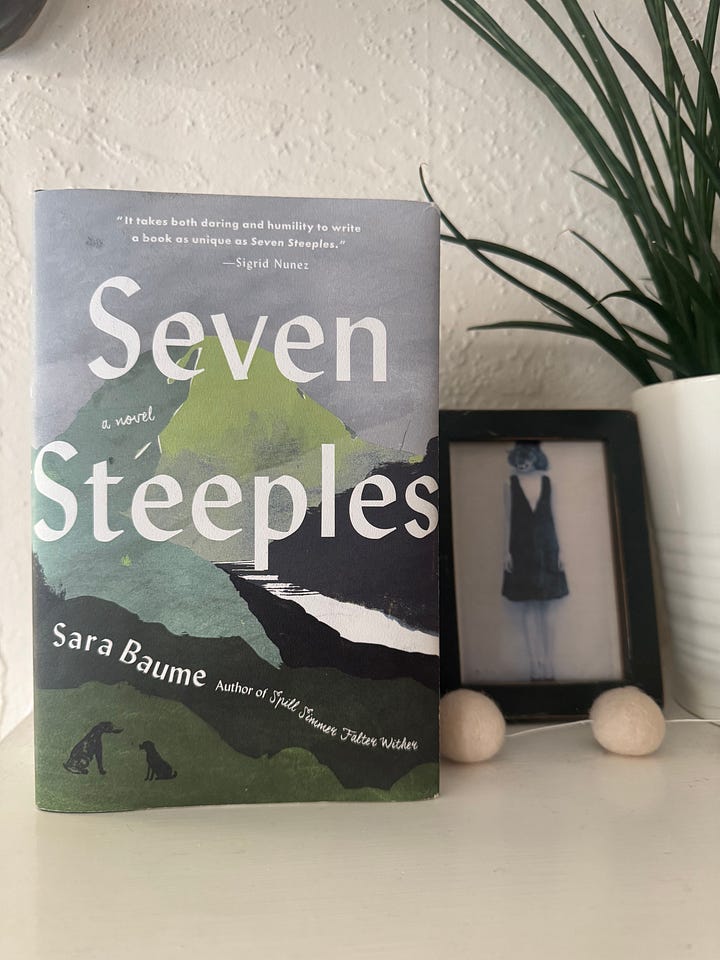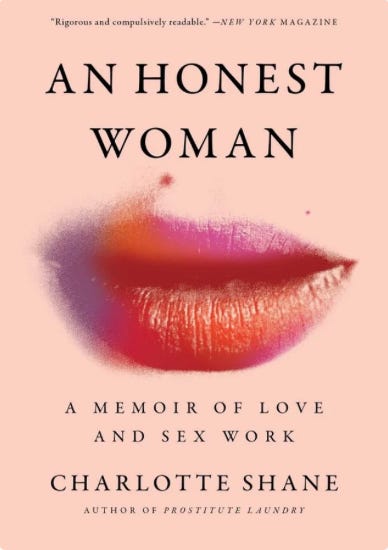Spring green
Imagined idylls, anywhere but here
I’ve been gone awhile. Working too much, trying to adjust to dawning authoritarianism, and, to be honest, troubled that this platform has become another place where my efforts feel inadequate. Like many others, I retreated here some years ago for the simplicity of the interface, the sense of intimacy and quiet. Now, though I adore many of the newsletters I read and the people behind them, it feels very busy here. Every literary celeb has arrived, every content type is possible, every analytic is tracked, and an infinite scroll of others’ thoughts and accomplishments streams by around the clock. It’s become another place where I’ll never catch up, another invitation to unbounded FOMO.
But I do love to share my thoughts about the books I’ve read and will continue to do that. I’ve published some reviews this year:
I wrote an essay in Dirt about my nose and Ugliness, Afghan-born, Berlin-based artist and writer Moshtari Hilal’s new book
For Words Without Borders, I reviewed Bread and Milk, Swedish writer Karolina Ramqvist’s new memoir about food
For Full Stop, I reviewed Danish writer Fine Gråbøl’s What Kingdom, a work of autofiction about mental illness
For Prior, I wrote about my abiding love for Laura Esquivel’s Like Water for Chocolate
In January and February, I read 15 mostly great books. The standout was Seven Steeples, an Irish novel of natural wonder and domestic decrepitude by Sara Baume.


I was profoundly moved by this book, a minutely observed, nearly plotless novel about a young man and woman who move to a house in rural Ireland with their dogs and recede almost entirely from so-called normal life. It's a stunning record of nature's cycles—seasons, storms, scenes of serenity—and a portrait of the everyday life of a couple, exploring the ways two people can fuse into a kind of twinship that's both romantic and claustrophobic. The book is also a Sisyphean account of domestic life, a record of the wear, erosion, and decay wrought by time.
This was the inaugural read in a new book club I joined and it was interesting to hear others' takes. Where I found comfortingly familiar messes (receipts and mandarin peels mingling in the cup holder of an old van) and a kind of punk rejection of the status quo, others saw a sickening lack of attention to housekeeping and personal hygiene. The grime affected me, too—I cleaned my refrigerator with particular vigor following book club—but mostly I swooned for Baume’s gorgeous writing, her gentle, rhythmic, and impressively controlled descriptions of a home and its surroundings and her evocations of impossible philosophical questions. Questions about love, growth, weather, death: everything we’ll never fully understand. She’s one of my new faves.
I also loved Hum by Helen Phillips. In a not-too-distant future, a mother pining for analog pleasures wants her children to experience life without their “bunnies,” the AI-assistant-in-a-wristwatch that guides them through every moment. But when she plans an impulsive, bunny-less vacation to a walled garden park—one of few remaining places where nature is on view—her dream turns into a nightmare.
If it sounds like I’m writing this in the voiceover style of a trailer for a thriller, it’s because that’s how the book read to me. It was hard to put down, and creepy in a satisfying way because it so accurately depicts the insidiousness of the technology we now can’t live without. It’s a chilling dystopian novel about maternal anxiety, nostalgia, gig work, tech, and the difficulty, perhaps impossibility, of imparting our generation's sense of freedom to our kids. The opposite of uplifting. But good.
The Position of Spoons by Deborah Levy
I'll read anything Levy writes. Her writing combines sensuality and wry humor and her tripartite memoir (or "living autobiography," as she calls it) is an exemplar of the form. The Cost of Living is one of my favorite memoirs. I also enjoyed her last novel, August Blue. This is her latest and it contains some lovely writing—as ever, Levy’s mind is a pleasure to be with. But, and it pains me to say this, the 34 very short essays collected here are mostly rather thin. One gets the distinct sense that after the success of her last book, her editor called and said, "Deb, is there anything on your desktop we could package and sell?" I wanted much more. But these are quick and digestible bites and this would make a pretty gift for an acquaintance, maybe one with just a passing interest in literature.
Group Living by Lola Milholland
Among my friends, let’s start a commune is such a common expression that it’s practically meaningless at this point. But when I say it, I really mean it! :) I am at least always seeking books about experiments in communal living and was very excited to discover this one (not only because of the adorable cover.) This is a smart, spirited, rich, funny, self-aware account of writer and food-business owner Lola Milholland’s life in group settings—first as the child of hippies in Portland, Oregon, and then living with her brother, partner, and friends in her childhood home. Milholland makes a strong case for dwelling outside the nuclear family paradigm while being honest about the challenges of navigating adult life alongside people you didn’t marry or make. She maintains a tender admiration for her forebears while shrewdly unpacking the many things Boomers got wrong.
Food and food politics are central to this narrative and that always makes me happy. Milholland mentions commune cookbooks of the 1970s, which I collect, including Lucy Horton’s Country Commune Cooking—I got to interview Horton for this piece years ago. Reading Group Living, I also learned that mine wasn’t the only mom who instructed her daughters not to sleep with underwear on because “your vagina needs to breathe.” Anyway, Milholland is great company—crunchy, but canny, with good recipes. I was actually disappointed when this one ended.
Life on Svalbard by Cecilia Blomdahl
I’m in an Arctic frame of mind, learning about glaciers, expeditions, watching YouTubers in Yakutsk, and rereading Barry Lopez’s Arctic Dreams, which is (still) astonishing. I have a strong desire to experience Longyearbyen, Norway, the world’s northernmost town, and have told my partner that after my children move out of the house, we’ll be moving there for a year. (He doesn’t believe me.) In Longyearbyen, on the island of Svalbard, polar night brings round-the-clock darkness for a third of the year, and polar day brings blinding light for another third. This book, by a Swedish woman (now an influencer) who moved there 10 years ago and fell in love with the place, chronicles her life on the island. It’s a simple pleasure—a straightforward account of what it's like to live there, which I found fascinating.
Some others I liked lately:
Health and Safety by Emily Witt
I Heard Her Call My Name by Lucy Sante
An Honest Woman by Charlotte Shane
The Rent Collectors by Jesse Katz
Jimi Hendrix Live in Lviv by Andrey Kurkov
Tree Spirits Grass Spirits by Hiromi Ito






I recommend two important books about Gaza. Both helped me feel less like I’m losing my mind: One Day, Everyone Will Have Always Been Against This by Omar El Akkad and Being Jewish After the Destruction of Gaza by Peter Beinart.
Last week, I did an event with three memoirists at Berkeley’s Hillside Club, and I recommend their fantastic books, too: Dust by Summer Brenner, Portrait in Red by L. John Harris, and Hugging My Father’s Ghost by Zack Rogow.
The stacks keep growing, so: more to come. In the meantime, happy reading 📖🌷🫖








i feel the same way about substack: the scroll has become the stuff of writer's nightmares, but sometimes I'll write something and someone will message me and be like "I needed to read what you wrote today" and i'm like "oh yeah, that's what it's for"
What a strange coincidence! I’m currently also obsessed with Svalbard and Cecilia Blomdahl and am also conniving to move to Svalbard. Trømso may be the best next step for me with a cabin in Svalbard. Anyway, very cool to see my own strange obsessions echoed by others.
Arctic Dreams is so jaw dropping good. I picked up his memoir Horizons recently. For more arctic fiction, I recommend per Peterson “Out Stealing Horses” and Hannah Pylvaïnen “The End of Drumtime.” Oh, and the next mission impossible coming out was filmed in Svalbard! Really looking forward to the landscapes. I’m excited to check out Seven Steeples. Thanks for sharing!